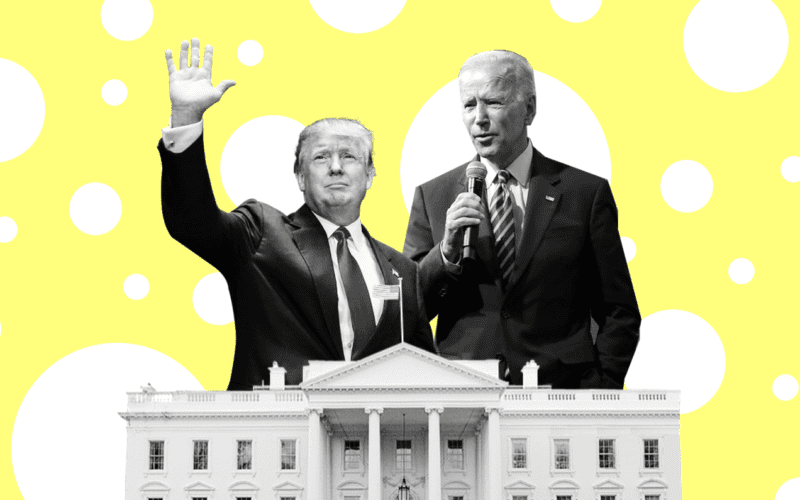GOOD AFTERNOON and welcome to The Yappie’s special briefing on Asian Americans and Pacific Islanders in the 2020 election cycle. Support our work by making a donation and send tips, events, feedback, and opportunities to [email protected].
The Big Story
WHAT’S AT STAKE TODAY — We’ve endured months of campaigning, sleepless nights, and endless headlines — and now it’s time for you to exercise your fundamental right to vote. Here’s why the 2020 election will be consequential for Asian American and Pacific Islander communities…
?️ THE WHITE HOUSE: In August, Sen. Kamala Harris (D-California) became the first Asian American to appear on a national ticket as Joe Biden’s (D) running mate. Today, the daughter of Indian and Jamaican immigrants has the chance to go even further — and could become the most powerful AAPI official in U.S. history.
BALANCE OF POWER: While much of the political oxygen has been consumed by the face-off between President Donald Trump (R)and former vice president Biden, control of Congress and state governments will ultimately be more impactful in shaping the priorities of AAPI advocacy groups over the next four years. According to the Asian Pacific American Institute for Congressional Studies, voters have the chance to usher in a fresh wave of AAPI lawmakers, with dozens of AAPI incumbents and challengers on the ballot for House and Senate races.
- The field: Some House members like T.J. Cox (D-California) are fighting for their political lives, while newcomers from both parties like Maine Senate candidate Sara Gideon (D), Orange County congressional hopeful Young Kim (R-California), and Texas’ Sri Preston Kulkarni (D) are seizing on their opportunity to make history.
- What to expect: Democrats are hoping that a surge in AAPI turnout will deliver crucial wins for progressive candidates in swing states like Texas, along with closely watched races in California. If they strengthen their majority in the House, we’re likely to see membership in the Congressional Asian Pacific American Caucus rise slightly. Rep. Pramila Jayapal (D-Washington) is also pushing for a restructuring of the Congressional Progressive Caucus, which she leads.
? DOWN BALLOT: Mai Nguyen Do, a researcher at the nonpartisan policy research firm AAPI Data, also writes that a record number of Asian Americans are running for state legislature seats. The results are guaranteed to shape looming fights over redistricting, healthcare reform, education, and more.
- Notable: Voters in California are poised to decide the fate of 12 ballot measures including Prop. 16, which would overturn the state’s longtime ban on affirmative action. Asian American voters appeared split on the measure in an AAPI Data survey released in September.
On The Trail
? THE WIDE VIEW — This election, more than anything, will be a referendum on the Trump administration’s handling of the coronavirus pandemic. 232,000+ Americans are dead. Millions more are sick. And COVID-19 has left AAPI communities grappling with thousands of coronavirus-related hate crimes, skyrocketing unemployment, and unprecedented rates of anxiety and depression. Record numbers of AAPI businesses are still closing and Asian joblessness remains at historic highs, with no sign of another relief package from Congress.
- Mobilizing voters: Democratic groups like the DNC, DCCC, ASPIRE PAC, and the AAPI Victory Fund have gone to unprecedented lengths to court AAPIs this cycle, hiring dozens of dedicated staff and blanketing swing states with millions of dollars in multilingual advertisements.
- Biden has also made his own impressive investments. The campaign was the first to hire an AAPI director during the Democratic primaries and recently launched a seven-figure paid media campaign, including national television spots and rare op-eds in AAPI ethnic media. In a final show of strength, more than 1,100 AAPI prominent community members threw their support behind Biden, according to a list obtained by The Yappie.
- The other side: The GOP has also been wooing AAPI voters, though their comparatively tepid efforts have been hindered by President Trump’s repeated use of anti-Asian rhetoric. The Trump campaign and the RNC did not respond to The Yappie’s repeated requests for comment, and only the Biden campaign provided a written plan aimed at AAPI communities.
Preview
? WHAT TO EXPECT TONIGHT — The Asian American Legal Defense and Education Fund (AALDEF) tells The Yappie it hopes to release preliminary results from its multilingual exit poll of Asian American voters at 10pm ET. The New York-based civil rights organization has conducted similar exit polls in every major election since 1988, and Asian voters at 93 poll sites in 13 states and Washington, D.C. will be asked about their top issues and candidate preferences.
WHAT WE KNOW — The number of Asian American eligible voters is at an all-time high, according to the Pew Research Center, with 11 million AAPI voters eligible for participation in this year’s election (nearly 5% of all U.S. eligible voters).
- The 2020 Asian American Voter Survey, published by a trio of AAPI groups in September, found that more than half of registered Asian American voters were more enthusiastic this election cycle. With AAPIs set to be the margin of victory in hotly contested races across the country, we’re already seeing historic increases in voter participation.
- Tom Bonier, CEO of the political data firm TargetSmart, said Monday that Asian American voters have already “exceeded their total 2016 vote in every single southern and sunbelt presidential battleground state.” Catalist CEO Michael Frias notes that the broad growth in turnout is seen mostly among young Asian Americans, Axios’ Shawna Chen reports.
- Context: Roughly 345,000 Asian American early voters across 11 states who didn’t vote in 2016 (but were old enough to do so) have already voted this year, according to a Washington Post analysis, though NBC News’ Claire Wang and Ronnie Li write that AAPIs are experiencing higher than average mail-in ballot rejection rates compared to the general population. More than 100 million Americans have cast their ballots so far.
? STATE OF THE RACE — While all signs suggest that a majority of AAPI voters will back Biden, watch to see if Trump can improve on his 2016 numbers. The president has seen some gains among Vietnamese and Indian Americans while his overall support among Chinese Americans has collapsed.
Long Reads
? Here are some election-related deep dives worth reading…
- “How 12 Asian Americans Are Voting in 1 Swing State” — by The Atlantic’s Shuran Huang and Eric Lee
- “Are Asian Americans the Last Undecided Voters?” — by the New Yorker’s Hua Hsu
- “Support for Trump is tearing apart Vietnamese American families” — by Vox’s Terry Nguyen
- “What It’s Like For Asian American Candidates During A Pandemic Marked By Racism” — by NPR News’ Chloee Weiner
- “How Hindu Nationalism Could Shape the Election” — by POLITICO’s Sonia Paul
- “Fake news spread on WhatsApp to Indian Americans plays stealth role in U.S. election” — by Reuters’ Paresh Dave
- “Asian-American students divided over affirmative action” — by CalMatter’s Janelle Marie Salanga
- “Asian American family embodies generational shift in politics” — by NBC News’ Rima Abdelkader and Shako Liu.
? Enjoying The Yappie? Make a donation, forward this briefing to a friend, or subscribe here. You can also follow us on Twitter, Instagram, and Facebook.









